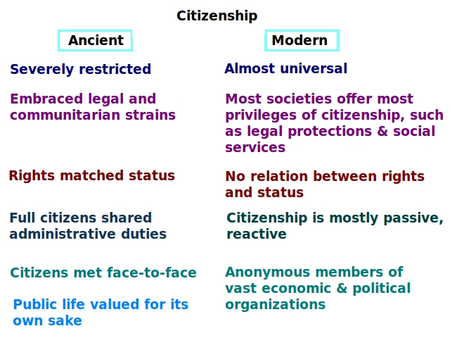Most likely the greatest difference between modern democracy and Golden age Athenian democracy is that of the men only policy. This essay will explain the themes and patterns of ancient Athenian democracy and modern New Zealand democracy their similarities and differences cultural expectations and codes of behaviour.
 History Of Citizenship Wikipedia
History Of Citizenship Wikipedia
In the old age only men were allowed to vote and take part in assemblies.
Ancient greek democracy vs modern democracy. Demos meaning people and crata meaning rule together meaning people rule. Previous Figure Next Figure. Ancient and Modern Democratic Practice and Institutions Compared.
Greek civilizations thrived for almost 1300 years ago. After all the majority of personal accounts. A Companion to Greek and Roman Political Thought.
The term democracy first appeared in ancient Greek political and philosophical thought in the city-state of Athens during classical antiquity. What Is the Use of Studying Ancient Democracy. Page 35 of 50 - About 500 Essays Analysis Of Athenian Democracy.
Athenian democracy is similar to modern democracies in that it grants a broad portion of the public a say in governance. Still using Athenian democracy as a case study of Ancient democracy in practice democracy did not extend equality and franchise to all persons and therefore allowed direct participation only by male citizens small political elite to the exclusion of the majority of. The Athenian Democracy Compared to Todays Democracy.
Ancient Athenians participated in a direct democracy. The Greek idea of democracy was different from present-day democracy because in Athens all adult citizens were required to take an active part in the government. Historians alike It might seem absurd to pose the question of whether the great city of Athens was the leading promoter of democracy in the rest of the Greek city-states during the 4th and 5th centuries.
Every citizen went to the assembly and voted on the issues. The Practices of Democracy. The term democracy comes from the Greek language and means rule by the people Democracy Building 2012 The democracy in Athens represents the events leading up to modern day democracies.
In the second module we consider the key differences between ancient and modern democracy before looking in the third and fourth modules at two of the key institutions of Athenian democracythe popular assembly ekklēsia and the law courts dikastēria. Ancient Greek politics philosophy art and scientific achievements greatly influenced Western civilizations today. Ancient Greeks lived in Greece and countries we now call Turkey and Bulgaria.
The elections back then were also different. In the fifth module we focus on an institution common to both ancient and modern. In that respect at least modern democracies is far more inclusive than ancient Greece.
Demos means more or less the people cracy derives from kratos which means strength or rule so democracy rule by the people. Moreover if they were voting on whether or not to go to war the voters did not go home afterwards to put their feet up while professional soldiers carried out their orders they went home to pick up their armour and go off to fight. Another similarity is seen between ancient Athens and modern democracy when a lack of representation for a city-state or nation as a whole is seen.
Todays democracy allows both eligible men and eligible women are to vote. In most modern democracies women usually participate fully both in voting and holding office. Use the videos media reference materials and other resources in this collection to teach about ancient Greece its role in modern-day democracy and civic engagement.
Modern democracy argues for those imbalances to be wiped out in society. The word comes from dêmos common people and krátos forcemight. This unique achievement was made possible with the creation of the polis which in English means the city-state.
Athenian democracy developed around the fifth century BCE. Under Cleisthenes what is generally held as the first example of a type of democracy in 508507 BC was established in Athens. Many democracy-governed countries like Australia are based on the laws and policies of the Ancient Greek democracy.
The word democracy originated from the Greek words. The first known democracy in the world was in Athens. Like our modern democracy the Athenian democracy was created as a reaction to a concentration and abuse of.
In modern democracy there are still examples where the people or demos of a nation feel excluded from the decision making within the government Everyone shouting for their rights means that no one is clearly heard Euben Wallach and Ober 330. Important still the facet of equality and Franchise manifests a clear difference between ancient democracy and modern democracy. Ancient Greece and Australia compared are very.
Compare and contrast Athenian democracy and modern democracy. Athenian Democracy Democracy is from the Greek. Women slaves as well as children were not allowed to vote and could not be citizens.
Athenian democracy was select. In antiquity women had no public role and resident foreigners and slaves were not allowed to participate either so the percentage of the actual population that shared in Athenian. One example of their legacy is the Olympic Games.
